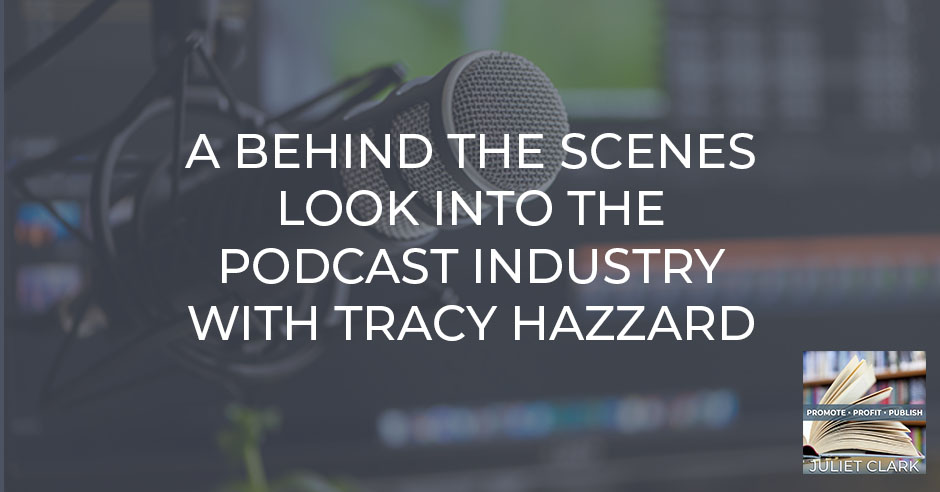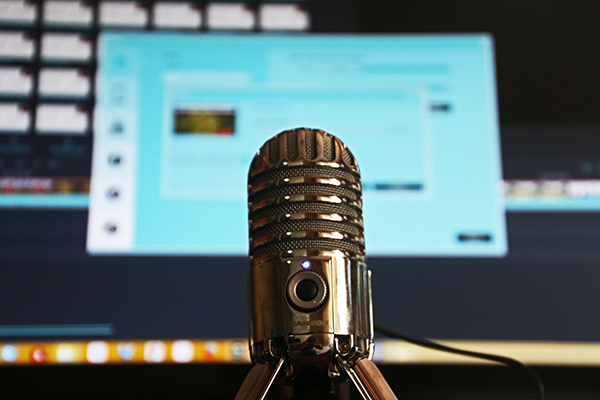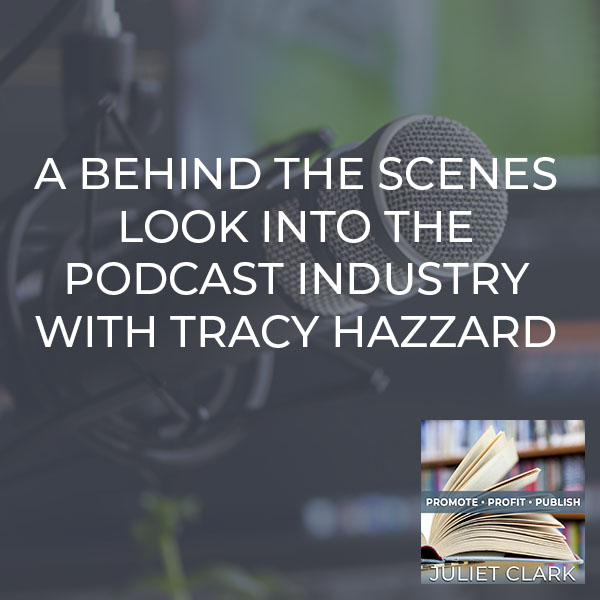
The podcast industry is having a little bit of a resurgence right now. Especially last year because of the pandemic, mostly everyone had to or are still working from home. The fact that everyone is remote and side-by-side with their phone or computer, starting a podcast has never been this easy. Today, join Juliet Clark and her guest, podcast strategist extraordinaire Tracy Hazzard. Tracy is the CEO and Co-founder of Podetize, the biggest post-production podcast in the world. If you’re interested in starting your own podcast, listen to what Tracy has to say about podcast production, how to find clients, profit models, and many more.
—
Watch the episode here
Listen to the podcast here
A Behind The Scenes Look Into The Podcast Industry With Tracy Hazzard
We have an old favorite back on the show. Before we get to our oldie but goldie here, I want to remind you to go over and take our Promote Profit Publish quiz, www.PromoteProfitPublishQuiz.com. Remember, your book is not about writing it and not about selling it. It’s about the audience you build and what you can do with that audience to build bigger, better products and know what they want, need and how to promote yourself. Remember to go over and take the quiz and find out if you’ve got it all together and you’re ready. Everybody we have on here is also over on our YouTube channel. Go over and subscribe to Super Brand Publishing. You can see these are real people. I’m not sitting here like The Simpsons doing voices. These are real interviews with real people.
Podcasters prefer to not go through someone else. Share on XWe want to welcome back Tracy Hazzard. I had her husband on a while back. For those of you who don’t know Tracy, she’s a seasoned media expert with over 2,600 interviews from articles in Authority Magazine, BuzzFeed, Inc. Magazine column and her multiple top-ranked videocasts and podcasts like The Binge Factor and Feed Your Brand, one of the CIOs top 26 entrepreneur podcast. Tracy brings diverse views from what works and what doesn’t work in marketing, branding and media from thought leaders and industry icons. She’s redefining what success looks like in the media world. Welcome, Tracy.
Thank you. It’s exciting to talk to you again.
We’ll call you the Dr. Ruth of media.
I don’t think there is much that we haven’t talked about.
As you remember from the past episode, Tracy owns Podetize with her husband, Tom. They are the biggest post-production podcast company in the world. They deal with a lot of podcast production. They have started a new program where they find you interviews and that’s what I want to talk about. I know we’ve talked about it in the past but we want to find out how you know you’re getting ROI from these and what to do and what not to do. Take it, Tracy.
The guesting program came out of the fact that I kept teaching people that you’re approaching podcasters wrong. Stop doing this. Stop sending these horrible pitch letters. Stop sending these ridiculous one-sheets that work maybe if you were targeting regular standard media, traditional old school media or if you’re doing speaking engagements. It’s not the same thing when you’re approaching podcasts.

Podcast Production: Stop sending those horrible pitch letters or ridiculous one-sheets that work maybe if you were targeting traditional old school media. It’s not the same thing when you’re approaching podcasts.
Podcasts and most podcasters follow a digital marketing model. It’s more like approaching a blogger to guest blog for you or feature your product, feature you and share you approaching an influencer like that then it is approaching a media conglomerate. That’s how this program came about. Like everything else in my business, people would be like, “Tracy, do it for me, please.” That’s how this came about. It’s over a year since we’ve been doing it. We haven’t been selling it until late 2020.
In the past, I sent these to you all the time, I get people that pitch me and I go look them up, never heard of them and I send them to you because you’re an influencer and I’d think, “Maybe she has.” You rarely heard of them either. Here’s one of the things I noticed the most, I can tell they’ve never listened to my show because they’ll tell me how much they like my show, “Which is your favorite episode and why?” I never hear from them again.
Podcasters have giant egos. Like all the celebrities that are doing TV shows, media, you’re never going to get them anyway. Stroking their ego doesn’t work. You’re going through producers. With podcasters, there are no producers in the mix. There’s none of that, “Let’s deal with the facts.” There’s no one in there. There’s the ego at the other end and maybe an assistant who’s busy and who’s going to pass stuff through and that’s about it. Instead, we get these horrible pitches that are all about me and not about the show, which is what you’re experiencing by realizing that they never even listened to it.
Worse than that, it’s because they’re pulling lists from one single place in the podcast ecosystem. They’re pulling their list from a place called Listen Notes. You could do that yourself and not pay a publicist a ton of money to pull a crappy list for you. That’s what they’re doing. They’re pulling a bad list because they’re not utilizing the criteria properly. Not that you can do it that well over at Listen Notes. We have our proprietary system that we utilize here that we do and that’s why people kept saying, “Tracy, pull me the list for me. It would be easier.” It’s that list-building side of things that if you don’t tip it, you don’t look carefully and you don’t craft it. As you always say, Juliet, to the audience you want to talk to then you’re going to get junk results.
The indie podcasters are still 90% of the content out there. Share on XTo give you some context of that, I’ve had plumbing coaches, “I want to be on your show.” How many of you want to hear that? It’s not the niche of the show.
If you had an architectural show maybe but not if you’re doing a show on Promote Profit Publish. It doesn’t make sense. Your title doesn’t even make sense. They should have weeded that one out instantly but it’s because nobody’s spending the time. They’re like, “It’s cheaper and easier for them to buy a list just like we used to buy email lists. Blank it and send it out and hope somebody responds than it is to go through the list ourselves and weed it out.”
I remember a while back, our friend Jim Beach had somebody pull one offline. I remember going through it when he gave it to us gratis. Most of the shows weren’t even in publication anymore.
That’s the number one criteria. Most often, you’ll find out that the first thing you should do and you can do even in Listen Notes is to screen through someone who hasn’t posted in the last week. What happens is because, in the media publicists and others, they hear about these seasons. They’re afraid to not miss a season of a show. There are so few. There’s such a small percentage, less than 2%, of podcasts that have seasons at all. Almost all of that 2% are controlled by large networks. Your chance of getting to be a guest on their show is slim anyway. If we screen out instead and say, “If someone hasn’t posted in the last week and they’re not being consistent and constant with our content then they’re not a show that I want to be on.” If we take that tact, we’re going to get a better list from the beginning.
Let’s talk about that little piece for a minute. You and I were working on a project. I didn’t realize until I went through the content that you had that many of the podcasts are produced by big media companies now. It’s not, “I’m rare to be a little guy.”
That’s not 100% true. The ones that we hear about, the ones that make the top list, the ones that we see, the reality is they represent about less than 10% of the whole podcasting ecosystem. The indie podcasters are still 90% of the content out there. They’re not the big numbers that qualify for advertisements. Out of the whole ecosystem of what I call active podcasters, there are two million podcasts out in the marketplace, there are only about 400,000 or so of them that are active, that post every single week, are in that process, that isn’t what we call pod faded, dead podcasts or old podcasts. That’s a limited group when you think about that. Out of two million, that’s pretty small. Out of that group of people, there’s only 10% of them that are at this network level, able to take on high brand advertising and other things like that. There’s still a lot of play for everybody else out there to get a feature.
One of the things that I know my authors are intent on is there are many services contacting them on LinkedIn. I have the same thing. I usually book or people reach out to me to book. For the most part, I don’t go seeking a lot of interviews. They’ll say, “This company has come at me. They’ll get me five interviews for $5,000.” If you’re going to purchase something like that, what do you consider? How do you know you’re getting ROI from it? I want some return on my investment if I invest $5,000.
Here’s the thing, if you’re not defining those clear-cut criteria at the beginning, you’re not going to hire the right company. If the clear-cut criteria that you’re setting say, “I want to sell books on this show.” Your chances of doing that on a show that is mismatched with you, if it’s not a right fit from an audience perspective, then you will not sell books. It’s not going to happen. That’s where we have to go in and look at the audiences of each of the shows. They’re not going to take the time to build you a list, screen through and find the perfect right fit matches for you that they know are good quality shows, have good audiences. They have a tie-in to tell whether or not there’s even a decent enough-sized audience there.

Podcast Production: Who do you want to be in your marketplace? Who’s one step ahead with getting more publicity than you? Know who they are and follow them around the podcasting sphere.
I’m not a fan of huge audiences. We get more conversion attraction from the nano, micro-influencer level, which is usually less than 100,000 plays per month. Usually, even better if we do 10,000 or less per month. We’ll still get a good conversion rate. You’ll sell more on those shows. You’ll get more subscribers if that’s what you’re looking for. At the end of the day, that’s what I look for. That’s what I would want more myself. If you’re service provider, publicist, the company, the guest, booking agent isn’t going to do that for you, they’re instead going to program through their list and go, “Who do we know who we’ve called before who we’ve gotten ten other authors on the show before or ten other guests onto their show before?” They’re willing to take guests. They’re not putting in the amount of work necessary for it to be worth spending that money.
That is such a good point. I want to go back to something you said because we’re talking about a done-for-you model where I go to Tracy and I say, “Find this.” One of the biggest marketing fails I see out there with people is they say, “Tracy, it’s done for you. Now go do it.” They don’t do their part. What is the expectation if I hired you for a done-for-you? What would you need me to do?
First of all, I want you to give me at least 30 days upfront. If you don’t give me 30 days, I can’t do the things I need to fix your one sheet, your website. It gets you ready to be pitched at the same time that I’m finding you the exact right fit partner. I need to learn about you and get all those details. I’m going to pull it out of you because I know my clients don’t want to do the work. That’s why they hire me. We have to do some of our homework up front. This is what I get all the time, I get one-sheets that have like, “I can talk about SEO.” What about SEO? Everybody and their brother talk about search engine optimization. What’s special about you? What do you bring that’s special and different?
We have to force that down into, “I want to talk about this topic,” into, “I’m an expert in these areas of this topic.” We have to get to where that specialness lies and then it makes it easier for us to pitch our clients to the podcast host. It also makes it easier for the podcast host to go, “I never talked about that on my show before. I want to talk about that.” You’re giving them great topic ideas at the same moment that makes you attractive. It also makes it easier to see if I’m looking through you and I’m understanding you better, it makes me understand what shows are going to be a better fit for you.
So many people don't want to deal with or learn about the marketing aspect of what they're doing. Share on XOne of the practices we do is we look at you and say, “Who do you want to be in your marketplace? Who’s about a year ahead of you? Who’s one step ahead with getting more publicity than you?” We want to know who they are and we’re going to follow them around the podcasting sphere. We’re going to look and see where they guested before. We’re going to see if those are the right fit for you or not. Sometimes they will be. Sometimes they won’t be. Sometimes that person didn’t have a good podcast booking agent. We can check that. We see that and then we can always say, “Podcast host, you had so and so on the show before. I talk about it from a female perspective. Wouldn’t you like to hear about that?” Nine times out of ten, that works. It’s easier that way and it gets you right up there side by side with that competitor you’ve been trolling.
To be clear though, a done-for-you doesn’t mean that I show up, pay you, go away and you work your magic. I have to have some input into it.
Research and input at the beginning and that’s the important part. Let us get to know you. Give us the details about what your goals are and things like that. This is the thing, we look for what I call active clients. We look for clients who are going to participate in the process. When they sub it out, when they say, “My assistant will deal with all that.” It will turn out badly for you. You will get bad results. We try to force that out in our sales models so that it won’t happen. If you don’t take the sales calls, if you don’t participate in the onboarding, you’re not going to be a good client.
I agree. I see that all over marketing, where you fill out the intake and then your assistant handles the rest and it doesn’t hit the mark. To get the essence of you into all of your marketing and to the podcast and everywhere, you have to show up. I know so many people don’t want to deal with or learn about the marketing aspect of what they’re doing.
Many times we buy what some people call a done-for-you program. Essentially, you’re filling out all the information yourself. That’s not what we do here. Our job is to pull it out of you but then write it for you. Pull it out of you and then build you the best list possible and then have a conversation about that because maybe it’s not the right fit. We have touchpoints along the way before we’ve done the work all the way through.
When we pull a list of 25 podcast shows that we think you should be on, after the first 5 to 10, we send you the list and have you give us feedback. That way, you don’t have to vet the entire 25 lists yourself because I don’t want you to do that much work. You can spot check out through ten of them and say, “That sounds like the right show. I like that host. That sounds like the right audience for me. You understand me. You’ve got this right,” before we fulfill all our deliverables.
Sometimes what happens is that when you work with lots of publicists and lots of booking agents, they drip it out to you one by one. It doesn’t feel like you’re on the path. They’re pivoting. You say, “I didn’t like that one.” They then change it to somewhere else. You might miss a whole group of exciting podcasts that you could have been on because you made one comment that you didn’t like this one particular show they put forward to you because they dripped it out.
Let’s talk about that for a minute, publicist versus working with you guys. Publicists do a traditional media pitch and they often work with the people that they know over and over versus finding that real niche for you. Would that be accurate?
Yeah. Many of you are going to need a media-level publicist. You need to be featured in the local news and newspapers. You need to be featured in magazines and publications. Publicists are great at that because their relationships help get you in the door of places that you wouldn’t be able to get otherwise. That’s why they’re gold. You want to mine those relationships. With podcasting, the relationships aren’t there. If you have a relationship with a good media agent, it’s rare.
I’ve done this for a long time and I have 100 media people who send me guests and I probably pick about 6 or 7 of them every year. It’s small in the scope of things. There’s not an opportunity to build up what I call a rapport. We don’t have that with the media agents and the publicists that are out there. What we’re looking for is specific sometimes that it doesn’t fit them day in and day out. Luckily, if we’re great at our specificity about who we’re looking for, they will get back to us occasionally with a good fit.

Podcast Production: Publicists are great because their relationships help get you in the door of places that you wouldn’t be able to get otherwise. That’s why they’re gold. You want to mine those relationships.
That’s what I train the publicist who contacts me. It’s like, “Don’t contact me unless it meets these criteria.” When it meets that criteria, they send them to me and they’re great. You have to train them to do that. That’s hard when there are also podcasters going in and out, hosts disappearing, they pod fade all the time. It’s a lot of time investment on the publicist side that they don’t want to do for someone who’s not going to stick around.
Another program I see out there a lot is, “I’ll give you a list and you reach out to these people and pitch yourself.” A lot of work.
It’s a lot of work but I have to say that it is more effective. If you’re willing to do that, it can be more effective. If I reach out on your behalf, I’m going to get about a third of them. It’s going to happen, 1/3 are going to convert. If I gave you that list back and said, “For the 2/3 that didn’t convert, are you willing to send this message, which I give you ahead of time, in LinkedIn to this person?” You’ll easily convert another half of that group.
Why is that?
It’s because podcasters prefer not to go through someone else. They don’t want to go through an assistant. What happens is a lot of times when I allow a publicist or assistant in through the process, I get a whole load of messages I don’t need as a podcast host. Beyond scheduling, it’s like, “So and so is concerned about their equipment. The podcast guest you have scheduled for next week wants to know when it’s going to air.” They asked me a whole bunch of newbie questions that drive me crazy and it’s not worth it to me.
I’d rather get somebody who’s glad and eager to be on my show that they’re willing to send me a direct message. We find our match because the message is crafted properly. I go, “Great. Now you’re going to be on my show. Now we have this direct, simple chat conduit. I know you’re not going to be a difficult guest. I know this is going to be easy to book and I’m going to get you on my show. It’s going to be straightforward. Through it, it’s going to be a nice fit for both of us. We’re all going to walk away with that with a win-win.” We want that. Most podcasters are doing everything themselves. The last thing they need is ten emails to book a guest.
I’m one of those. I book everything. I have an intake sheet and a calendar link. I’ve automated as much as I can. Once you’ve been a guest, what is your responsibility? It’s not just ego-driven like, “I’ve been on the show and I’m going to post it once.” On the other side of it, book people tend to be, “Buy my book,” obnoxiously. How do you temper the two and promote to write them out?
First things first, for you authors out there, what I do want to say is my number one thing is when you go on the show, share generously. Stop saying, “It’s in my book. Buy it and read it.” Nobody wants to hear that on a podcast. That will be a guarantee that those listeners won’t buy your book and the host won’t do a great job of sharing you. They won’t care at that point. If you share generously on that show stories that maybe aren’t in your book, there are ways to do that, you’re going to get more out of the whole experience and you’re going to give the podcast host something to share. There’s something that they’re going to be able to promote out in social media, a tidbit you didn’t say in your book or something extra. Bonus materials are valuable. Those things are going to make it easier for them to promote your show and sell some of your books. It’s a win-win. We want them invested in that process for us. That’s the first part of it. If you do that well, then the whole post side of it is easy.
The number one easiest way to get a podcast host to accept you as a guest is to tell them what you’re going to do for them. I will prepare out a video teaser. I will put out 4 or 5 social posts once the episode airs. You can’t always do that ahead of time. I’ll share a quote from the show. I’ll share something about the host. I might share the episode itself in a blog. I might share the video from it. I’ll share it in multiple ways so that they get about a week’s worth of promotion over the course of a month because I tried to drip it out. That’s a better pace for people to notice it. I do that across all my social media, so I have a large reach.
To flip that, I can also invite them to be a guest on my show, which is helpful for me. When we do a podcast swap, they get publicity in exchange. For me, I can always read an article about them. Even if I can’t do a podcast hosting swap because my show is not a fit for them, I can also write an article and that helps get them. I’m giving them a lot in exchange. It’s easier to book me then. They get more out of booking me than they do some random person who sent them saying, “I want to sell a book on your show.” If we’re good at the promotion on the back end, it doesn’t matter how big our audience is. If we know my audience and your audience is a nice match together and I’m going to do a good job of promotion, you’re a lot higher likelihood of a candidate for my show. It’s going to make it easier.
I got an invite to be on somebody’s show and that is what he told me upfront, “I saw you shared it everywhere. The problem is the topic. You didn’t bother to dive into the topic.” I wasn’t appropriate for his show. I said, “I know nothing about commercial real estate. I’m honored that you asked but I don’t know if you can tell me why I’m a good fit on a commercial real estate show.”
This happened to me. I was invited to J. Massey’s Cashflow Diary, which is a great show in the passive real estate investing area. He’s great. It’s a great show. It’s always been top-ranked. I was like, “I don’t know that I can talk about that kind of investing. I’m not that kind of investor. I don’t know anything about it.” He said, “I’m inviting you to my show because you can share it everywhere.” He wanted me to talk about Amazon selling as a passive investment strategy.
I went on to tell everybody, “It’s not a passive investment strategy. It’s a heck of a lot of work.” We had a lot of fun doing that. It was okay because people were thinking that in their heads and I debunked it for them. You never know why someone invites you on the show. Push back and ask because if it’s not a right fit, you’re wasting your time and theirs and that’s not a great idea. Good thing you said, “I’m not sure about this. Tell me why I should.”
I said, “Go back and listen to Whitney’s episode. Tell me what you thought. I could be of service for your audience.” He did come back and he’s like, “I don’t know.” I turned it down but I was honored that he asked.
That’s because he’s looking for someone who can share well. That’s his goal. He probably had someone pulling a list together of people who share well without looking deeper into the criteria. That’s why this list-building side of it, to me, is the most critical part. I had Mark Herschberg on my show. He is an author. He wrote a book on careers and planning out your career. He could talk on any show because you’re either advancing your career or you’re starting in the world in your career. He had many different topics he could dive into. He’s a professor at MIT. It was easy stuff. He could be on anybody’s show.
He built the list himself and I was his 99th interview. He has done over 100 guest interview spots. Over time, he got honed in and found the right niche every single time and he could see the exact boost to his book sales every time a podcast came out. He could see his rankings and his sales move up. They were clicking it and his sales would happen. He could see it sometimes before he received the email from the host saying, “Your episode aired.” When an episode airs in a podcast, sometimes that happens overnight. It might happen at 2:00 in the morning pacific time or something.
By his time, 6:00 AM and he’s looking at his stats or whatever, he’s already had some international traffic who downloaded it earlier. That’s where he would be like, “I’m already seeing people. The podcast must have aired. Let’s see whose it is.” An email with follow-up sometime during that day and he’d realize, “It was this one that aired and I’m getting a boost from it.” He was seeing the direct response happening from him being on the show. He’s super crafted at what he does. He’s easy. He shares everything. He’s generous about what it is.
He knew every time we went on it that it was going to be the right fit for both of them. He took a few risks too. He tested a few shows, didn’t know if they were going to work. One of my best tips to people is don’t discount a brand new show. A publicist will say, “This show doesn’t have a track record. They haven’t launched yet. They are not aired yet. If they’re not associated with a celebrity, they won’t put you on a brand new show.” That’s a mistake. When a show is brand new, it might not make it. That’s true. It might not make it past 25 episodes. It might not even make it past ten.
The reality is if they are doing their show, the most promotion they’ll do for that show is in the first eight weeks. If your episode is in those first groupings of shows, those first ten shows, you’re going to get the most traffic. What happens is as the show grows over time, if they are successful, the first episodes are always some of the most listened to episodes of all time. People will go and check out the first few episodes, check it out around there and then join, subscribe and listen to the most recent one. The early ones capture their eyes first. It’s a hidden secret.
What you mentioned there is a great strategy of why you want to continue to be on a podcast. If you’re not on page one on Amazon, chances are people are not going to find you. That’s what we do with the quiz when speakers are out speaking, which they’re not doing. Those thank you pages where they click and you get a conglomerate of sales from that, it pushes you up in the ranking and keeps you on page one. If you’re on page 2 or 3, chances are nobody will ever find your book if they don’t have your name and the name of the book and search it. It’s not going to happen. If they put in a topic, they’re going to go there and find it because you’re on that first page.
That was Mark Herschberg’s point. He’s like, “I’m doing 100 shows. I didn’t do 100 in 100 days. I did 100 shows over the course of a year because I wanted my book, The Career Toolkit, to continually sell.” He wanted to have that sustainable sales model. Over time, that’s likely then to get picked up in a publication. That’s likely to get on the higher media over time.
Tracy, this has been fabulous. People learned a lot about why you should do these podcast tours. Where can people find you? You have a program as well. Do you have a page you can send them to and find out more about that?
There are two million podcasts out in the marketplace, but only about 400,000 or so of them are active. Share on XYou can go to Podetize.com and there’s a guest services section in there. I suggest you book an inquiry. That’s the fastest way. Book an inquiry with my team. Sometimes you get Tom. He’s been on your show before. A lot of times, you get Tom, who happens to be available for the call. That’s the best way because it’s not the right fit for everyone. We want to make sure that it’s going to be right for you, your book and right for what you want to accomplish. If we can right fit match those goals with what’s going on in the podcast ecosystem then we can make it a win-win for all.
Thank you so much for being on.
Authors out there, think about the profit model. That’s why I love Juliet’s title here, thinking about that profit model. We always have to think about that. No matter whether we’re doing our promotion or we’re doing our writing, we’re always thinking about that profit piece because it’s important.
Thank you.
Important Links
- www.PromoteProfitPublishQuiz.com
- Super Brand Publishing – YouTube
- Tracy Hazzard
- Tom Hazzard – Previous episode
- The Binge Factor
- Feed Your Brand
- Episode – 2020 Marketing Resolutions With Tracy Hazzard
- Podetize
- Cashflow Diary – Tracy Hazzard Helps Us Take Our Ideas Into the Real World
- Episode – Leveraging Stories In The Public Speaking Industry At The Time Of Pandemic With Whitney McDuff
- Mark Herschberg – Previous episode on The Binge Factor
- The Career Toolkit
About Tracy Hazzard

Tracy Hazzard is a seasoned media expert with over 2600 interviews from articles in Authority Magazine, BuzzFeed, and her Inc. Magazine column; and from her multiple top-ranked videocasts and podcasts like The Binge Factor and Feed Your Brand – one of CIO’s Top 26 Entrepreneur Podcasts. Tracy brings diverse views from what works and what doesn’t work in marketing, branding and media from thought leaders and industry icons redefining success around the globe.
Tracy’s unique gift to the podcasting, marketing, and branding world is being able to identify that unique binge-able factor – the thing that makes people come back again and again, listen actively, share as raving fans, and buy everything you have to sell.
Love the show? Subscribe, rate, review, and share!









Leave A Comment